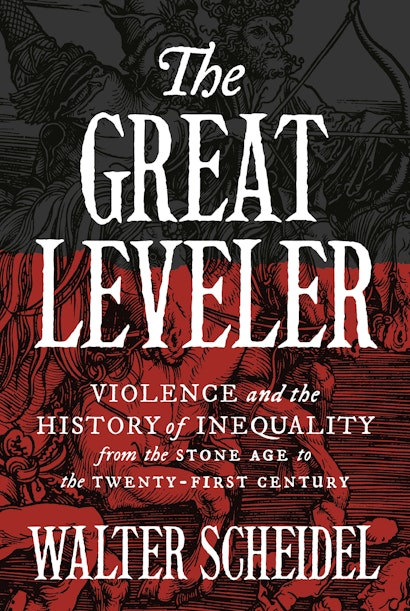"Walter Scheidel’s The Great Leveler is a smartly argued book. As you may be able to tell from the title, Mr. Scheidel makes the case that throughout history, inequality has led only to terrible things (think pandemics and wars). For anybody who has ever debated issues related to inequality and their broader meaning, this book provides more than just a powerful thought experiment."—Andrew Ross Sorkin, New York Times
"Mr. Scheidel's depressing view is bound to upset [those] who quite naturally might prefer to live in a world in which events might move political and social systems to figure out a more equitable way to distribute the fruits of growth without the plague, the guillotine or state collapse."—Eduardo Porter, New York Times
"Sweeping and provocative."—New Yorker
"One by one Scheidel dismisses the non-catastrophic alternatives that have been the focus of virtually every peaceful movement for social justice: democracy, the extension of the franchise, education, economic growth, social democracy, trade unionism and the welfare state. Their effects, he demonstrates, have been comparatively trivial and have never compensated for the inexorable march of inequality."—J. C. Scott, London Review of Books
"An astonishing tour de force."—Gregory Clark, Wall Street Journal
"In [Scheidel's] magisterial sociopolitical history The Great Leveler, inequality is shown as preferable to the alternative: society levelled by vast upheavals."—Aaron Reeves, Nature
"As a supplier of momentary relief, the Great Depression seems an unlikely candidate. . . . Yes, it brought widespread suffering and dreadful misery. But it did not bring death to millions, and in that it stands out. If that counts as relief, you can begin to imagine the scale of the woe that comes before and after. [Scheidel] puts the discussion of increased inequality found in the recent work of Thomas Piketty, Anthony Atkinson, Branko Milanovic and others into a broad historical context and examines the circumstances under which it can be reduced."—The Economist
"Reducing inequality by peaceful means looks harder than ever, giving Mr. Scheidel's arguments even greater resonance."—Buttonwood, The Economist
"A scholarly and ambitious book."—Paul Mason, The Guardian
"A thoroughly unsunny . . . but fascinating look at the engines of our discontent."—Kirkus
"A new history of wealth inequality from primitive times to the present that is provoking wide debate."—David Talbot, San Francisco Chronicle
"Tight labor markets shrink income inequality by causing employers to bid up the price of scarce labor, so policymakers fretting about income inequality could give an epidemic disease a try. This might be a bit extreme but if increased equality is the goal, Stanford's Walter Scheidel should be heard. His scholarship encompasses many things (classics, history, human biology) and if current events are insufficiently depressing for you, try his just-published book The Great Leveler: Violence and the History of Inequality from the Stone Age to the Twenty-First Century. Judge this book by its cover, which features Albrecht Durer's woodcut 'The Four Horsemen of the Apocalypse.'"—George Will, Washington Post
"In his remarkable new book, The Great Leveler, historian Walter Scheidel shows that . . . reducing inequality has always been a miserable business. . . . Magisterial."—Ian Morris, BBC History Magazine
"[Scheidel] draws on mountains of data to examine the social, economic and political forces that have been responsible for the growth of material inequality—and those that have reduced wealth. . . . Fascinating."—Glenn Altschuler, Huffington Post
"Scheidel's excellent survey has the merit of drawing evidence from the smallest scrap—height in burial sites, records of wages or rations, differences in house sizes over time, for example."—Ben Collyer, New Scientist
"He is a formidable global historian for whom no place or period is beyond reach. . . . Scheidel questions whether anything can prevent resurgence and persistence of inequality."—Avner Offer, Times Literary Supplement
"A readable and quirky history of economic inequality from the great apes to the modern day. . . . It is well worth the read. It is, in a word, gripping."—Victoria Bateman, Times Higher Education
"A new comprehensive and compelling account of the history of inequality by Walter Scheidel suggests that the only means of substantially levelling economic outcomes have been mass mobilisation war, violent revolution, pandemics (think bubonic plagues) and state failure."—Ryan Bourne, City AM
"One of the most important books on geostrategic trends to have been published in some years. . . . A dark masterpiece, and everyone who thinks about global trends should read it."—Ian Morris, Stratfor
"The current tome that has policy circles all abuzz."—Dave Neese, The Trentonian
"The Great Leveler is a fascinating and informative book, and likely to become a classic—as a warning about our fate if we accept inequality as a law of nature. But now we know better."—Crawford Kilian, The Tyee
"A perceptive, if grim, explanation for the ever-widening socio-economic gap in America, for the growing practice of paying corporate leaders 300 or 400 times what's paid workers on the shop floor, and for the reasoning behind appointing a Cabinet filled with billionaires. who have little in common with average citizens."—Bill Mares, Vermont Public Radio
"The Great Leveler is a fantastic piece of social science."—Mark Koyama, Public Choice
"This book will be widely read and spur a wave of critical scholarship."—Choice
"Try The Great Leveler, by Walter Scheidel. In this well-reviewed nonfiction book, the author argues that only catastrophes like pandemics and great, violent upheavals like world wars can ever address economic inequality. Hey, you're depressed anyway. Might as well be educated as to why."—Randi Kreiss, Long Island Herald
"I am greatly impressed by his ingenuity in constructing his data-sets. . . . A very brave attempt to say very important things backed up by enormous empirical research. . . . This is a fascinating, brave and important book. I recommend that you should read it."—Michael Mann, Millennium: Journal of International Studies
"Mr Scheidel's evidence is so persuasive that readers will find themselves cheering on the Black Death as a boost to median wages."—Janan Ganesh, Financial Times
"A convincing—if depressing—portrait of wealth equalization over time and across space."—Anthony Comegna, Cato Journal
"Depressing and thought-provoking."—Isaac Chotiner, Slate
"Depressing and convincing."—The Economist
"A bold argument which . . . offers the kind of sweeping, provocative ideas that global history lends itself to well."—Matt Elton, BBC History Magazine
"In this remarkable study, [Scheidel] argues that after agriculture (and the agrarian state) was invented, elites were amazingly successful in extracting all the surplus the economy created. . . . Mr Scheidel suggests that inequality is sure to rise. We must prove him wrong. If we fail to do so, soaring inequality might slay democracy, too, in the end."—Martin Wolf, Financial Times
"Scheidel’s book provides new insights about why inequality is so persistent—and why it is unlikely to decline anytime soon."—Atle Hetland, The Nation
"The Great Leveler is a fantastic piece of social science. . . . This is a must-read book for anyone interested in either inequality or in the long-run trajectory of human societies."—Mark Koyama, Public Choice
"It is a very good thing that this book was written as we definitely need to understand inequality and how to avoid it to make this world tolerable."—Pennsylvania Literary Journal
"Walter Scheidel’s fascinating book about violence and inequality stimulates much thinking about both topics, causing the reader to rethink the inequality debate even aside from violence."—William Easterly, Journal of Economic Literature
"Alphaville’s favourite scholar on [inequality] is Stanford’s Walter Scheidel and, in particular, his book The Great Leveler."—Jamie Powell, Financial Times
"If you think you've heard it all about economic inequality, think again. Walter Scheidel's analysis of what really reduces inequality is provocative, but he makes the case with reason, evidence, and style."—Steven Pinker, author of The Better Angels of Our Nature: Why Violence Has Declined
"Brilliant, erudite, and chock-full of historical detail, The Great Leveler has a powerful message and asks a big question for the twenty-first century: Can we find a cure for inequality that isn't worse than the disease?"—Branko Milanovic, author of Global Inequality: A New Approach for the Age of Globalization
"This is the best book on the history of income inequality. And the central message is that most significant reductions in inequality come through violence and destruction. Have a nice day!"—Tyler Cowen, author of The Complacent Class: The Self-Defeating Quest for the American Dream
"This brilliant and thoroughly researched book solves a major paradox in the study of historical inequality. If we accept Thomas Piketty's rule that returns on capital are greater than the rate of economic growth, the 10,000 years of evolution since the Neolithic period should have resulted in all wealth becoming concentrated in the hands of a single individual or family. The Great Leveler explains why that didn't happen. A major breakthrough in our understanding of the historical dynamics of income and wealth inequality."—Peter Turchin, author of Ultrasociety: How 10,000 Years of War Made Humans the Greatest Cooperators on Earth
"Inequality and violence are fundamental features of human society. No one before Walter Scheidel has shown us just how closely they have been intertwined. This is a masterful new assessment of an age-old problem."—David Stasavage, coauthor of Taxing the Rich: A History of Fiscal Fairness in the United States and Europe
"The Great Leveler makes a convincing case."—Robert J. Gordon, author of The Rise and Fall of American Growth
"This superb, and superbly written, book justifies its profound but pessimistic conclusion that in world history inequality has declined significantly only as a result of violent changes caused by wars, state breakdown, or pandemics. It should have a huge impact on world historians and generate interesting and important debates about growing inequality in today's world."—David Christian, author of Maps of Time: An Introduction to Big History
"Walter Scheidel offers a fascinating and powerful analysis of how worldwide income and wealth inequality have evolved from the Neolithic revolution to today. No other book on inequality has the temporal breadth or reach of Scheidel's book. And his interpretation is strikingly new."—Philip T. Hoffman, author of Why Did Europe Conquer the World?


